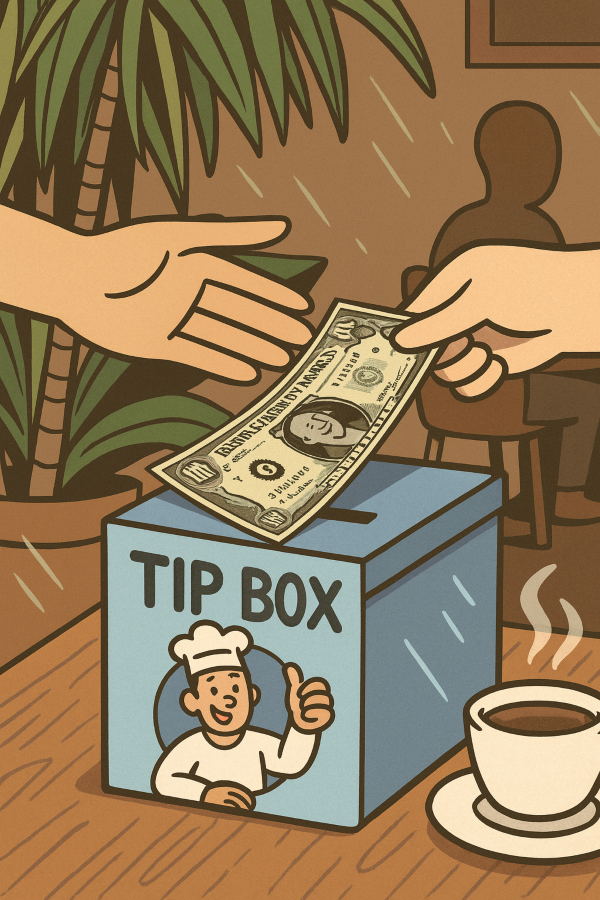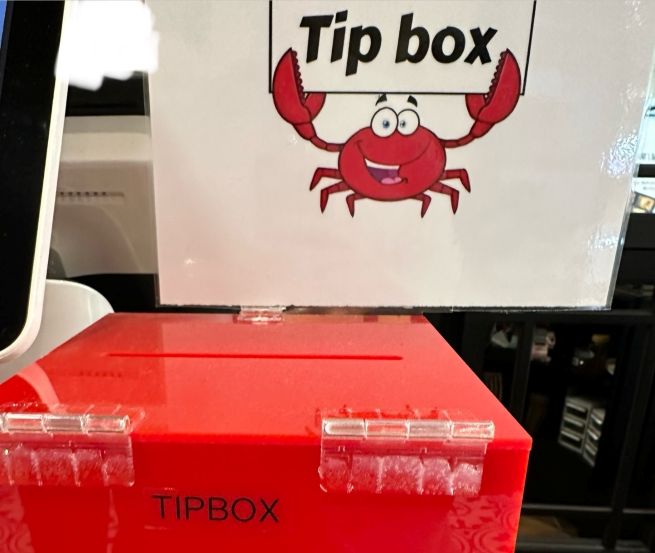

Debate Heats Up Over Tip Boxes in Korea’s No-Tip Dining Culture (Image supported by ChatGPT)
As tip jars quietly appear in restaurants, backlash grows against what many see as creeping Americanization of service culture
SEOUL, August 4 (Korea Bizwire) — A growing number of South Koreans are voicing frustration over the appearance of tip boxes in local restaurants, igniting debate over whether a foreign practice should be grafted onto a service culture traditionally rooted in hospitality without expectation of gratuity.
The controversy resurfaced late last month when a restaurant in Seoul’s Yeouido district placed a tip box at its counter. The box bore a message thanking patrons for their visit and stated the staff’s commitment to top-tier service. Online backlash was swift.
“This is Korea. Don’t bring tip culture here. Don’t pollute the water,” wrote one user on the popular community site “Thread.” Others echoed the sentiment, questioning whether service quality would now vary based on how much extra customers paid.
Similar incidents have emerged in recent months, including a restaurant offering patrons the option to pay 300 won (~$0.23) for “staff dinner funds” via kiosk and a pizza shop that required a ₩2,000 tip to process an order. While the tipping remained voluntary, many consumers interpreted the gestures as intrusive.

A tip box is seen installed at the counter. (Photo source: Screenshot from a post by Thread user ‘pnw_angler’)
Tipping, a standard part of dining culture in the U.S. and Europe, has been slow to take root in South Korea, where customers expect prices to reflect full service. Under current law, restaurants cannot require gratuities, though the mere presence of a tip jar is not prohibited.
Historians trace tipping back to 16th- and 17th-century Europe, where nobles gave gratuities to servants. In the United States, it evolved into a capitalist structure, further complicated by racial inequalities and low-wage labor systems. Today, tipping is considered by many Americans a burden, with “tipflation” — tipping expectations exceeding 20% — becoming the norm in major cities.
In South Korea, however, the cultural context is markedly different. “We traditionally show appreciation with gratitude, not money,” said Professor Heo Kyung-ok of Sungshin Women’s University, adding that the tip jar may clash with deeply ingrained social values.
Economic pressures are compounding public sensitivity. According to national data, dining-out prices rose 25% from June 2020 to June 2024 — significantly outpacing the overall consumer price index, which rose 16% over the same period. For many, tipping feels like an unwelcome surcharge atop already rising food costs.
A March 2025 survey found that 72.8% of respondents felt uncomfortable with tipping. Even among younger consumers, skepticism persists. “Service charges are already factored into the bill. Asking for more feels greedy,” said a 31-year-old office worker in Seoul.
Some users acknowledged that shop owners have the right to express preferences, including placing a tip box — just as consumers have the right to avoid those establishments. “It’s the market at work,” one commenter wrote. “If people don’t like it, they simply won’t return.”
Still, the broader consensus remains clear: South Korea is not yet ready to normalize tipping. As economic pressures rise and cultural expectations hold firm, restaurateurs may find that importing foreign service models comes with more backlash than benefit.
Lina Jang (linajang@koreabizwire.com)

Dining and Cooking